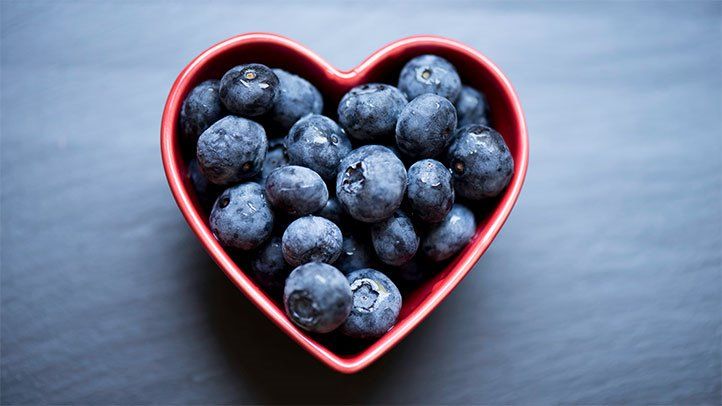Blueberries can improve cognitive and cardiovascular health
A recent study suggests that eating a few handfuls of wild blueberries per day could improve cardiovascular and cognitive health.
According to the study, the anthocyanins in blueberries are in charge of enhancing vascular and cerebral blood flow, which are some of the most likely mechanisms underlying normal cognitive performance.

Polyphenols, a group of plant-based chemicals with a growing body of evidence linking them to health advantages, include anthocyanins.
According to a recent study from King’s College London Faculty of Life Sciences and Medicine in the UK, a cup of wild blueberries is more than just a sweet treat. Additionally, it can improve cardiovascular health, lower blood pressure, and give you a mental boost.
The randomized, double-blind, placebo-controlled study discovered that those who consumed blueberries had better executive function, a stronger short-term memory, and quicker reaction times.
For a period of 12 weeks, study participants who consumed a drink made from 26 grammes (g) of freeze-dried wild blueberry powder daily exhibited enhanced blood vessel function and a 3.59 mmHG decrease in systolic blood pressure compared to those who took a placebo powder.
When given blueberries, participants performed better at switching accuracy and were better at recalling word lists right away. However, the delayed recollection showed no improvement, according to the researchers.
Every day, 178 grammes of blueberries
61 healthy Londoners between the ages of 65 and 80 made up the study’s male and female subjects. Over the course of 12 weeks, half of them drank a beverage every day that contained 26 g of freeze-dried wild blueberry powder. The other half ingested a placebo that was identical in terms of flavor, appearance, macronutrients, fiber, and vitamin C.
For precise measures, powdered ingredients are frequently used in food studies.
Participants consumed 178 grammes of whole blueberries in the form of 26 grammes of blueberry powder per day. Given that blueberries come in a variety of sizes, this amounts to roughly 75 to 80 blueberries.
It is not necessary for the blueberries to be wild, according to senior researcher Dr. Ana Rodriguez-Mateos. Since “other studies that have been conducted with other types of blueberries showing benefits in cognitive and vascular health.”
Anthocyanins: Beneficial organic pigments
The anthocyanins, blue pigments found in blueberries, are thought to be responsible for the health benefits. The study’s daily intake of powdered wild blueberries comprised 302 mg of anthocyanins. There was none in the placebo drinks.
According to Michelle Routhenstein, a dietician specialising in heart health who was not involved in this study, “anthocyanins are a class of polyphenols.”
She continued, “There are around 8,000 different kinds of polyphenols that have health advantages. Green tea, broccoli, pears, and spices like turmeric and cinnamon are a few additional dietary categories that contain advantageous polyphenols.
Strawberries, raspberries, red grapes, and purple vegetables all contain anthocyanins.
Other anthocyanin-rich foods have been shown to have health benefits. There is no reason to believe that they won’t have the same effect as blueberries. As long as the anthocyanins present in those meals are sufficient, bioavailable, and accessible, said Ana Rodriguez-Mateos, M.D.
How the study was created?
Dr. Rodriguez-Mateos and co-author Dr. Claire Williams had independently examined the cardiovascular and cognitive advantages of blueberries and observed comparable outcomes.
Dr. Rodriguez-Mateos explained that as a result, they “decided to investigate the effects on vascular and cognitive function simultaneously in one clinical study.”
They set out to evaluate cerebral blood flow since prior studies have suggested that it might be a mechanism underlying the positive effects of polyphenols in addition to increased vascular blood flow.
Recent discoveries about the gut bacteria and the gut-brain axis also motivated them to investigate this connection.
Polyphenols
There is still much to learn about the mechanism underlying polyphenols’ positive effects.
A possible explanation is that polyphenol “metabolites may act as signaling molecules, acting through several cell-signaling pathways, modulating nitric oxide bioavailability and different enzymes,” according to Dr. Rodriguez-Mateos.
After the 12-week study period, the researchers discovered increases in anthocyanin metabolites in the individuals’ urine.
According to Dr. Rodriguez-Mateos, “the mechanism of action in the blood vessels is endothelium-dependent and therefore mediated through the nitric oxide pathway.”
Although the study showed indications that blueberries increased cerebral and vascular blood flow, they observed no difference between those who consumed the fruit and the placebo group in arterial stiffness or blood cholesterol levels.
Nevertheless, according to Routhenstein, “when blood flow is improved, both heart and brain health benefit.”
According to Dr. Rodriguez-Mateos, “a hypothesis we proposed in our study is that polyphenols may act via enhancing the abundance of butyrate-producing beneficial bacteria, and therefore the production of butyrate.” This is in reference to the involvement of the gut microbiota. She stated that more research is necessary to prove this.
Foods good for heart, brain health
The American Heart Association claims that a diet high in fruits, vegetables, whole grains, lean proteins, minimally processed meals, and moderate amounts of oil and salt promotes improved cardiovascular and cognitive health.
A Mediterranean diet may be the best one for heart health, according to a recent study. The advantages of “green vegetables, in particular spinach, Swiss chard and kale rich in nitrates, which can help dilate the arteries,” were mentioned by Routhenstein.
“This helps to improve blood flow and vascular, heart, and cognitive function,” she said.
According to Routhenstein, there are many additional foods connected to cognitive wellness. “Omega-3 fats like wild salmon and sardines are linked to better cognition because of their rich DHA content and potent anti-inflammatory properties,” she noted.
Furthermore, “some studies suggest unsaturated fats, like omega-3 fats, may also help lower levels of beta-amyloid, a component in the development and progression of Alzheimer’s disease.”
REFERENCES:
- https://www.medicalnewstoday.com/articles/a-daily-dose-of-blueberries-could-improve-cognitive-and-cardiovascular-health
- https://neurosciencenews.com/cognition-blueberry-diet-22925/
- https://www.nutraingredients-usa.com/Article/2023/04/05/RCT-supports-blueberry-powder-s-vascular-cognitive-benefits
For Cardiovacular disease medications that have been suggested by doctors worldwide are available here https://mygenericpharmacy.com/index.php?therapy=11